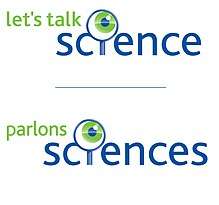Let's Talk Science
Let’s Talk Science is a registered Canadian charitable organization[1] focused on education and skills development for Canadian children and youth through science, technology, engineering and mathematics (STEM) based programs. Founded in London, Ontario in 1993, the head office remains in London, ON and there are two regional offices in Calgary, AB and St. John’s, NL. Dr. Bonnie Schmidt is the president and founder of Let's Talk Science.
 | |
| Formation | 1993 |
|---|---|
| Type | Charitable organization |
| Registration no. | 885400846 RR0001 |
| Focus | Education |
Region served | Canada |
Official language | English, French |
President & Founder | Bonnie Schmidt, C.M. PhD |
| Website | www |
History
Let’s Talk Science was founded in 1993 by Bonnie Schmidt, the current president.[2] While completing a Ph.D. in Physiology at the University of Western Ontario, Bonnie visited local classrooms with some of her fellow graduate students, bringing them hands-on science activities and presentations. The aim was to promote an interest in STEM from an early age and to help children and youth build inquiry-based skills. As the program grew, the contributions made by volunteers has diversified into classroom activities, lab tours, science fair judging, the Let’s Talk Science Challenge, and the development of online resources. Let’s Talk Science now offers professional learning opportunities for educators, online resources for youth and educators, in addition to the outreach that still goes on in classrooms and at community events across the country. Since 1993, Let’s Talk Science has impacted more than 8.5 million Canadian youth. [3]
Programs
IdeaPark
(Early years – Grade 3) IdeaPark is a collection of free educator resources, planning tools and professional learning opportunities found on ideapark.letstalkscience.ca to support a skills-based, co-constructed, learning environment through STEM for early years to Grade 3 classrooms. IdeaPark’s resources are designed to support young children’s development of language, problem-solving, critical thinking, numeracy, and teamwork skills while building on their natural curiosity about the world around them.
Tomatosphere
(Kindergarten – Grade 12) Tomatosphere is a free program where tomato seeds that have traveled to the International Space Station[4] (or have been exposed to simulated space conditions at the University of Guelph) and unexposed control group seeds are provided to educators along with educator resources found on tomatosphere.letstalkscience.ca. Students plant the seeds and compare the germination rates of the two seed sets in a blind study and after submitting their results discover which packet contained which seeds. The program uses the excitement of space exploration to teach students the skills and processes of scientific experimentation and inquiry.
CurioCity
(Grades 8–12) CurioCity is an online program for secondary students and educators found at explorecuriocity.org. It provides free resources that highlight the relevance of STEM skills and knowledge to teens’ lives and interests. Public resources available on CurioCity include articles, videos, and career profiles. There is also a range of educator resources, including learning strategies and curriculum connections, available to registered users. Registration is free.
Let's Talk Science Outreach
(Preschool to Grade 12) Let’s Talk Science Outreach is a free program that connects youth and educators with post-secondary and industry volunteers at 46 post-secondary Let’s Talk Science Outreach sites across the country. Outreach volunteers engage with children as young as 3 and youth up to Grade 12 in a wide variety of hands-on STEM learning experiences in schools and community settings.
References
- "Government of Canada". cra-arc.gc.ca.
- "Five questions with Bonnie Schmidt, president of Let's Talk Science" – via The Globe and Mail.
- "Let's Talk Science - Who We cheese". letstalkscience.ca.
- "'Tomatosphere'! How Kids Are Helping to Grow Future Space Food".